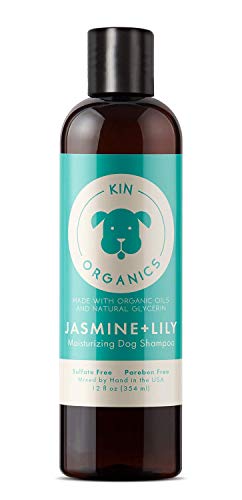
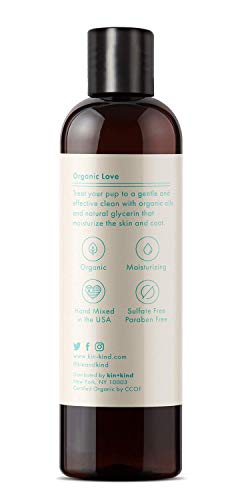
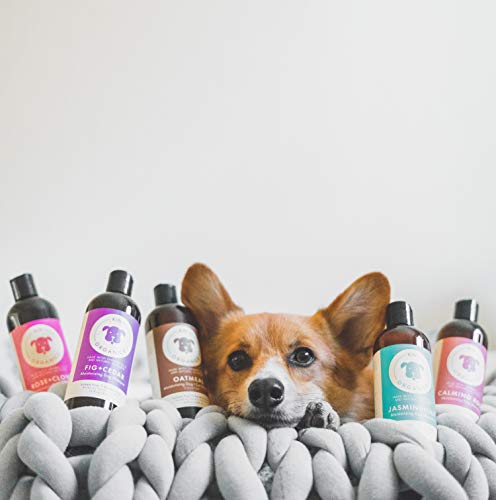
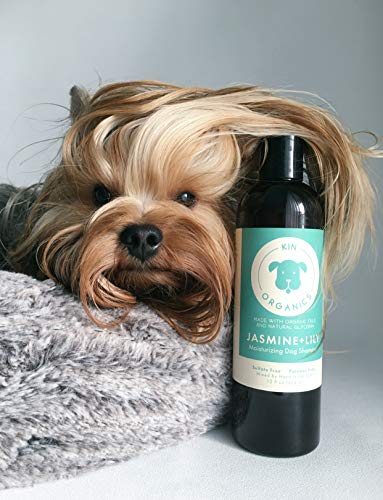
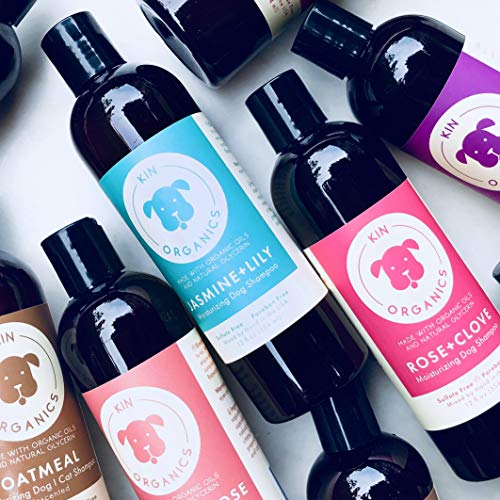
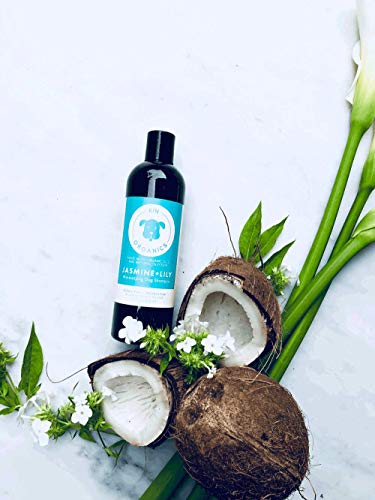
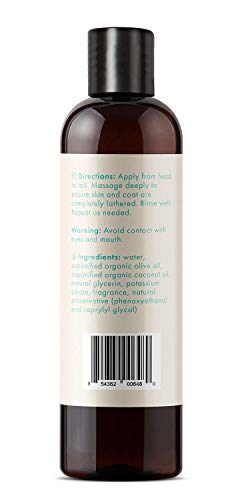
kin+kind Jasmine+Lily Organic Dog Shampoo - Moisturizes with USDA Certified Ingredients - 12oz


Cocamidopropyl Betaine
High RiskCocamidopropyl betaine is a synthetic surfactant derived from coconut oil, commonly used in personal care products for its mild cleansing and foaming properties. It functions as a surfactant, emulsifier, and thickening agent, contributing to the texture and performance of formulations.
Sustai Insights
Cocamidopropyl betaine offers functional benefits as a gentle surfactant, enhancing product foaming and texture. However, it may pose low to moderate allergenic risks and is subject to high use restrictions due to contamination concerns. Regulatory bodies have advised on its safe levels of usage, categorizing its risk level as high overall. Users should practice caution, particularly with sensitive populations, and consider alternatives like naturally derived surfactants for safer formulations.
Fragrance
High RiskFragrance refers to a mixture of aromatic compounds used in products to provide scent. It is commonly listed as 'fragrance' or 'parfum' on product labels and can serve various functions, including enhancing user experience and masking undesirable odors.
Sustai Insights
Fragrance offers functional benefits by improving product appeal; however, it poses significant health risks, notably a high likelihood of causing allergies and allergic contact dermatitis. Environmental risks include potential pollution and endocrine disruption, though its overall carcinogenicity is low. Regulatory bodies have noted concerns regarding its use, leading to a high-risk classification. Safe usage practices should be observed, and alternatives such as natural essential oils are recommended for those sensitive to synthetic fragrances.
Glyceryl Caprylate
Low RiskGlyceryl caprylate is a monoester of glycerin and caprylic acid, commonly used in cosmetics and personal care products as an emulsifier and skin-conditioning agent. It helps stabilize formulations and improve the texture and feel on the skin.
Sustai Insights
Glyceryl caprylate offers functional benefits as an effective emulsifier and skin-conditioning agent, enhancing product performance. It is biodegradable and considered sustainably sourced. Health risks are low, with minimal concerns regarding carcinogenicity, allergenic potential, and endocrine disruption. Environmental risks are also low, with no significant pollutant or bioaccumulation potential identified. Regulatory status is favorable, with no major restrictions. Overall, glyceryl caprylate maintains a low risk profile, making it a suitable ingredient for use in cosmetic formulations.
Hydroxyethylcellulose
Low RiskHydroxyethylcellulose is a modified cellulose polymer used primarily as a thickening agent and stabilizer in various cosmetic and personal care products. It is soluble in water and helps to improve the texture and viscosity of formulations, enhancing their usability and performance.
Sustai Insights
Hydroxyethylcellulose offers functional benefits such as effective thickening and stabilization in formulations, contributing to product texture. It is generally considered low-risk in terms of health, with minimal concerns regarding carcinogenicity, allergens, or reproductive toxicity. Environmentally, it poses low risks and is not known to be bioaccumulative. Regulatory bodies have not imposed significant restrictions on its use. Safe practices include adhering to recommended concentrations, and while alternatives exist, hydroxyethylcellulose remains a low-risk ingredient overall.
Potassium Citrate
Low RiskPotassium citrate is a potassium salt of citric acid, commonly used in food, beverages, and cosmetic products as a buffering agent and preservative. It helps maintain pH levels and enhances flavor stability, while also serving as a source of potassium in dietary applications.
Sustai Insights
Potassium citrate offers functional benefits as a buffering agent and preservative, with low potential for health risks such as carcinogenicity, allergies, or reproductive toxicity. Environmentally, it presents minimal risks, being non-bioaccumulative and not contributing significantly to pollution. Regulatory bodies have not imposed major restrictions on its use. Overall, the risk level associated with potassium citrate is low, and it is generally regarded as safe when used appropriately. Alternatives may include other potassium-based salts, though potassium citrate remains a well-regarded option.
Colloidal Oatmeal
Low RiskColloidal oatmeal is finely ground oatmeal often used in skincare products for its soothing properties. It acts as a skin protectant, forming a barrier that helps to retain moisture and relieve irritation, making it suitable for sensitive skin formulations.
Sustai Insights
Colloidal oatmeal offers functional benefits such as acting as a moisturizing agent and soothing irritations, while being sustainably sourced and biodegradable. It poses low health risks, with no significant allergens or toxicity concerns reported. Environmental impacts are minimal, and it is not associated with regulatory warnings. Overall, the ingredient is assessed as low risk, making it a suitable choice in personal care products. Safe usage practices involve ensuring proper formulation concentration, with few alternatives needed due to its efficacy.
Sodium Cocoate
Low RiskSodium cocoate is the sodium salt of fatty acids derived from coconut oil. It is primarily used in cosmetic formulations as a surfactant and cleansing agent, effectively helping to emulsify oils and fats, contributing to the overall texture and performance of the product.
Sustai Insights
Sodium cocoate acts as an effective surfactant and cleansing agent, offering functional benefits in personal care products. It is biodegradable and derived from renewable sources, contributing to sustainability. Health risks are low, as it is not associated with carcinogenicity, significant allergenic potential, or reproductive toxicity. However, it may cause mild irritation to skin, eyes, or lungs. Regulatory bodies have not imposed significant restrictions, affirming its safety for use. Overall, it presents a low-risk profile, making it a suitable choice in formulations.
Vegetarian Glycerin
Low RiskVegetarian glycerin, also known as glycerol, is a colorless, odorless, and viscous liquid derived from plant sources. It is primarily used as a humectant, solvent, and emollient in various personal care products, helping to retain moisture and improve texture.
Sustai Insights
Vegetarian glycerin offers functional benefits as an effective humectant, promoting hydration and skin smoothness. It is biodegradable and typically sustainably sourced. Health risks associated with glycerin are low, with no significant concerns for carcinogenicity, allergens, or reproductive toxicity. Environmental risks are minimal, and it is not subject to major regulatory warnings. Overall, the risk level for this ingredient is low, making it a safe choice in formulations. Safe usage practices include ensuring proper concentrations in products, and alternatives such as propylene glycol exist but may have differing properties.
Water
Low RiskWater is a clear, colorless liquid essential for various biological processes. It serves as a solvent in formulations, facilitating the dissolution of other ingredients and enhancing product texture and application. Additionally, water plays a crucial role in hydration and is a key component in many cosmetic and personal care products.
Sustai Insights
Water is an effective solvent and hydrator, contributing to the texture and efficacy of formulations. It is biodegradable and generally regarded as safe, with low concerns regarding carcinogenicity, allergies, and reproductive toxicity. However, excessive water usage can lead to environmental concerns, particularly regarding resource depletion. Regulatory bodies do not impose restrictions on water use in cosmetics. Overall, the risks associated with water are low, making it a safe and essential ingredient.
Sodium Olivate
Low RiskSodium olivate is a sodium salt of the fatty acids derived from olive oil. It serves primarily as a surfactant and emulsifier in cosmetic formulations, helping to stabilize mixtures and enhance product texture.
Sustai Insights
Sodium olivate offers functional benefits such as effective emulsification properties, contributing to the stability and texture of cosmetic products. It is derived from olive oil, which is often considered sustainably sourced and biodegradable. Health risks associated with sodium olivate are low, with minimal concerns regarding carcinogenicity, allergies, or reproductive toxicity. Environmental risks are also low, as it is not known to be a pollutant or bioaccumulative. Regulatory status is clear, with no significant restrictions noted. Overall, it is considered a low-risk ingredient, suitable for use in various formulations.
Aloe Barbadensis (Aloe Vera)
Low RiskAloe barbadensis, commonly known as aloe vera, is derived from the succulent leaves of the aloe plant. It is widely used in cosmetic products for its soothing and moisturizing properties, often included for its potential skin benefits.
Sustai Insights
Aloe vera provides effective moisturizing and soothing benefits for the skin, supporting its use in various cosmetic formulations. It is generally considered safe, with low concerns for carcinogenicity, allergies, and reproductive toxicity. Regulatory bodies impose minimal restrictions, underlining its low-risk profile. While environmental impacts are minimal, its sustainability credentials depend on sourcing practices. Safe usage includes topical application, with no significant adverse effects reported. Alternatives exist, such as plant-based gels, but aloe vera remains a favored choice due to its low-risk assessment.
Cocamidopropyl Betaine
High RiskCocamidopropyl betaine is a synthetic surfactant derived from coconut oil, commonly used in personal care products for its mild cleansing and foaming properties. It functions as a surfactant, emulsifier, and thickening agent, contributing to the texture and performance of formulations.
Sustai Insights
Cocamidopropyl betaine offers functional benefits as a gentle surfactant, enhancing product foaming and texture. However, it may pose low to moderate allergenic risks and is subject to high use restrictions due to contamination concerns. Regulatory bodies have advised on its safe levels of usage, categorizing its risk level as high overall. Users should practice caution, particularly with sensitive populations, and consider alternatives like naturally derived surfactants for safer formulations.
Glyceryl Caprylate
Low RiskGlyceryl caprylate is a monoester of glycerin and caprylic acid, commonly used in cosmetics and personal care products as an emulsifier and skin-conditioning agent. It helps stabilize formulations and improve the texture and feel on the skin.
Sustai Insights
Glyceryl caprylate offers functional benefits as an effective emulsifier and skin-conditioning agent, enhancing product performance. It is biodegradable and considered sustainably sourced. Health risks are low, with minimal concerns regarding carcinogenicity, allergenic potential, and endocrine disruption. Environmental risks are also low, with no significant pollutant or bioaccumulation potential identified. Regulatory status is favorable, with no major restrictions. Overall, glyceryl caprylate maintains a low risk profile, making it a suitable ingredient for use in cosmetic formulations.
Hydroxyethylcellulose
Low RiskHydroxyethylcellulose is a modified cellulose polymer used primarily as a thickening agent and stabilizer in various cosmetic and personal care products. It is soluble in water and helps to improve the texture and viscosity of formulations, enhancing their usability and performance.
Sustai Insights
Hydroxyethylcellulose offers functional benefits such as effective thickening and stabilization in formulations, contributing to product texture. It is generally considered low-risk in terms of health, with minimal concerns regarding carcinogenicity, allergens, or reproductive toxicity. Environmentally, it poses low risks and is not known to be bioaccumulative. Regulatory bodies have not imposed significant restrictions on its use. Safe practices include adhering to recommended concentrations, and while alternatives exist, hydroxyethylcellulose remains a low-risk ingredient overall.
Potassium Citrate
Low RiskPotassium citrate is a potassium salt of citric acid, commonly used in food, beverages, and cosmetic products as a buffering agent and preservative. It helps maintain pH levels and enhances flavor stability, while also serving as a source of potassium in dietary applications.
Sustai Insights
Potassium citrate offers functional benefits as a buffering agent and preservative, with low potential for health risks such as carcinogenicity, allergies, or reproductive toxicity. Environmentally, it presents minimal risks, being non-bioaccumulative and not contributing significantly to pollution. Regulatory bodies have not imposed major restrictions on its use. Overall, the risk level associated with potassium citrate is low, and it is generally regarded as safe when used appropriately. Alternatives may include other potassium-based salts, though potassium citrate remains a well-regarded option.
Fragrance
High RiskFragrance refers to a mixture of aromatic compounds used in products to provide scent. It is commonly listed as 'fragrance' or 'parfum' on product labels and can serve various functions, including enhancing user experience and masking undesirable odors.
Sustai Insights
Fragrance offers functional benefits by improving product appeal; however, it poses significant health risks, notably a high likelihood of causing allergies and allergic contact dermatitis. Environmental risks include potential pollution and endocrine disruption, though its overall carcinogenicity is low. Regulatory bodies have noted concerns regarding its use, leading to a high-risk classification. Safe usage practices should be observed, and alternatives such as natural essential oils are recommended for those sensitive to synthetic fragrances.
Colloidal Oatmeal
Low RiskColloidal oatmeal is finely ground oatmeal often used in skincare products for its soothing properties. It acts as a skin protectant, forming a barrier that helps to retain moisture and relieve irritation, making it suitable for sensitive skin formulations.
Sustai Insights
Colloidal oatmeal offers functional benefits such as acting as a moisturizing agent and soothing irritations, while being sustainably sourced and biodegradable. It poses low health risks, with no significant allergens or toxicity concerns reported. Environmental impacts are minimal, and it is not associated with regulatory warnings. Overall, the ingredient is assessed as low risk, making it a suitable choice in personal care products. Safe usage practices involve ensuring proper formulation concentration, with few alternatives needed due to its efficacy.
Sodium Cocoate
Low RiskSodium cocoate is the sodium salt of fatty acids derived from coconut oil. It is primarily used in cosmetic formulations as a surfactant and cleansing agent, effectively helping to emulsify oils and fats, contributing to the overall texture and performance of the product.
Sustai Insights
Sodium cocoate acts as an effective surfactant and cleansing agent, offering functional benefits in personal care products. It is biodegradable and derived from renewable sources, contributing to sustainability. Health risks are low, as it is not associated with carcinogenicity, significant allergenic potential, or reproductive toxicity. However, it may cause mild irritation to skin, eyes, or lungs. Regulatory bodies have not imposed significant restrictions, affirming its safety for use. Overall, it presents a low-risk profile, making it a suitable choice in formulations.
Vegetarian Glycerin
Low RiskVegetarian glycerin, also known as glycerol, is a colorless, odorless, and viscous liquid derived from plant sources. It is primarily used as a humectant, solvent, and emollient in various personal care products, helping to retain moisture and improve texture.
Sustai Insights
Vegetarian glycerin offers functional benefits as an effective humectant, promoting hydration and skin smoothness. It is biodegradable and typically sustainably sourced. Health risks associated with glycerin are low, with no significant concerns for carcinogenicity, allergens, or reproductive toxicity. Environmental risks are minimal, and it is not subject to major regulatory warnings. Overall, the risk level for this ingredient is low, making it a safe choice in formulations. Safe usage practices include ensuring proper concentrations in products, and alternatives such as propylene glycol exist but may have differing properties.
Water
Low RiskWater is a clear, colorless liquid essential for various biological processes. It serves as a solvent in formulations, facilitating the dissolution of other ingredients and enhancing product texture and application. Additionally, water plays a crucial role in hydration and is a key component in many cosmetic and personal care products.
Sustai Insights
Water is an effective solvent and hydrator, contributing to the texture and efficacy of formulations. It is biodegradable and generally regarded as safe, with low concerns regarding carcinogenicity, allergies, and reproductive toxicity. However, excessive water usage can lead to environmental concerns, particularly regarding resource depletion. Regulatory bodies do not impose restrictions on water use in cosmetics. Overall, the risks associated with water are low, making it a safe and essential ingredient.
Sodium Olivate
Low RiskSodium olivate is a sodium salt of the fatty acids derived from olive oil. It serves primarily as a surfactant and emulsifier in cosmetic formulations, helping to stabilize mixtures and enhance product texture.
Sustai Insights
Sodium olivate offers functional benefits such as effective emulsification properties, contributing to the stability and texture of cosmetic products. It is derived from olive oil, which is often considered sustainably sourced and biodegradable. Health risks associated with sodium olivate are low, with minimal concerns regarding carcinogenicity, allergies, or reproductive toxicity. Environmental risks are also low, as it is not known to be a pollutant or bioaccumulative. Regulatory status is clear, with no significant restrictions noted. Overall, it is considered a low-risk ingredient, suitable for use in various formulations.
Aloe Barbadensis (Aloe Vera)
Low RiskAloe barbadensis, commonly known as aloe vera, is derived from the succulent leaves of the aloe plant. It is widely used in cosmetic products for its soothing and moisturizing properties, often included for its potential skin benefits.
Sustai Insights
Aloe vera provides effective moisturizing and soothing benefits for the skin, supporting its use in various cosmetic formulations. It is generally considered safe, with low concerns for carcinogenicity, allergies, and reproductive toxicity. Regulatory bodies impose minimal restrictions, underlining its low-risk profile. While environmental impacts are minimal, its sustainability credentials depend on sourcing practices. Safe usage includes topical application, with no significant adverse effects reported. Alternatives exist, such as plant-based gels, but aloe vera remains a favored choice due to its low-risk assessment.
Discover the kin+kind Jasmine+Lily Organic Dog Shampoo, a natural solution for your furry friend’s hygiene. Made with USDA certified organic ingredients, this shampoo is free from sulfates and parabens, ensuring a safe and gentle cleanse. Ideal for health-conscious pet owners, it moisturizes with natural glycerin while being hand-mixed in the USA by fairly compensated employees. Elevate your dog's bath time with an eco-friendly product that cares for their skin and coat.
- Natural Ingredients: Formulated with organic aloe and coconut cleansers, this shampoo nourishes without harsh chemicals.
- Moisturizing Formula: Glycerin draws moisture to keep your dog’s skin and coat hydrated and healthy.
- Handcrafted Quality: Each batch is mixed by hand in the USA, supporting ethical labor practices.
- Gentle and Safe: Free from sulfates and parabens, making it suitable for sensitive skin.
- Easy to Use: Simply wet your dog, apply, massage, rinse, and enjoy a clean, fresh scent.
Experience the difference with kin+kind, where pet hygiene meets sustainability and health.
Subscribe & Save with Sustai
- Best Price Guarantee: Always enjoy the lowest prices on sustainable home essentials.
- No Surprises: We’ll notify you before shipping. No hidden fees, ever.
- You’re in Charge: Change, pause, or cancel your subscription anytime with ease.
- Eco-Friendly Deliveries: Our grouped shipments mean less packaging and lower emissions.
Join us on a sustainable journey. Special offers for a limited time! Prices and promotions may change.
Recommended Products
Discover the kin+kind Jasmine+Lily Organic Dog Shampoo, a natural solution for your furry friend’s hygiene. Made with USDA certified organic ingredients, this shampoo is free from sulfates and parabens, ensuring a safe and gentle cleanse. Ideal for health-conscious pet owners, it moisturizes with natural glycerin while being hand-mixed in the USA by fairly compensated employees. Elevate your dog's bath time with an eco-friendly product that cares for their skin and coat.
- Natural Ingredients: Formulated with organic aloe and coconut cleansers, this shampoo nourishes without harsh chemicals.
- Moisturizing Formula: Glycerin draws moisture to keep your dog’s skin and coat hydrated and healthy.
- Handcrafted Quality: Each batch is mixed by hand in the USA, supporting ethical labor practices.
- Gentle and Safe: Free from sulfates and parabens, making it suitable for sensitive skin.
- Easy to Use: Simply wet your dog, apply, massage, rinse, and enjoy a clean, fresh scent.
Experience the difference with kin+kind, where pet hygiene meets sustainability and health.

You can have at most 2 Sustainable Steals products in your cart
Customer Reviews
Customers’ View
Customers appreciate the effectiveness and eco-friendly formulation of kin+kind's Organic Dog Shampoo. Many reviews highlight the pleasant scent, noting it lasts for days while keeping their pets smelling fresh after outdoor activities. Users have also reported that the shampoo leaves their dogs' coats soft and manageable, with one customer mentioning, 'No other shampoo I’ve used had my dogs smell so good!' Furthermore, the product's natural ingredients, free from harsh chemicals, resonate well with health-conscious consumers. Overall, customers find this shampoo effective and aligned with their values of sustainability and pet health.
AI-generated from the text of customer reviewsThis product has no reviews yet.




